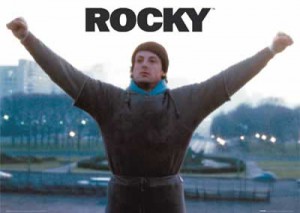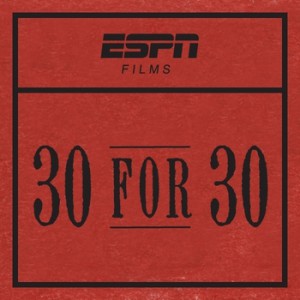
Hmm. Turns out Stallone had some inspiration for the Rocky franchise. Photo screen-grab from Rocky I.
(latest in an ongoing series of “reviews” of ESPN films releases. See here for Wikipedia list of all the original 30-for-30 films plus the add-ons).
“The Real Rocky” was an entertaining look into the life of Chuck Wepner, interspersed with snippets from the ongoing saga of his lawsuit against Sylvester Stallone, with Wepner narrating his life and all its ups and down in a matter-of-fact manner. All the while, a treasure trove of old boxing clippings, never-before-seen video of fights from the 60s and 70s and other classic boxing memorabilia were shown as supporting graphics and gave the documentary a very nice feel as it played out. The documentary does a good job of capturing the story of Wepner; a rather amazing story of a talented but relatively unskilled former marine who sold liquor by day and somehow ascended to be ranked the #8 Heavyweight boxer in the world in his spare time, during a time when Muhammad Ali ruled the sporting world and boxing never was more popular. He picked up the sport on a whim and quickly won a Golden Gloves championship, rocketing him into the professional ranks in his mid 20s.
The documentary also serves as a great reminder of just how far the sport has fallen in the wake of corruption, unethical promoters, multiple sanctioning agencies, and general American attention spans turning to MMA/Ultimate Fighting in the wake of Mike Tyson‘s downfall and a lack of highly ranked Americans in the sport. People forget that boxing used to be as popular a draw as the modern day “big-4” sports, with its champions regularly making front page sports news. Perhaps this was mostly attributable to the incredible self marketing ability of Ali himself; certainly the sporting world has yet to really see someone like him since.
Throughout the movie, a small band of (mostly New York-based) newspaper writers held court in a dark, smoky bar setting and opined about Wepner, his fights, and the golden age of boxing in general. I would have loved to see ESPN’s excellent set of boxing analysts be included in this round-table, as Bert Sugar, Teddy Atlas, Max Kellerman and Brian Kenny all are excellent analysts and have great opinions to add about boxing of yesteryear. It was surprising that an ESPN production didn’t seem to use any of its own people, perhaps something they decided not to force on the film-maker.
One takeaway point that I found fascinating was the attempts (both covert and overt) by Ali to turn the fight into a “racial war;” he reportedly asked Wepner to call him the “N-word” in a press conference, and when Wepner declined Ali forced the issue by alleging it on a talk show live and “inventing” some conflict. Clearly an act of showmanship, and an attempt to drum up even more interest in the fight. I would have loved to see an interview with Ali himself; clearly his declining current physical condition prevented this. But I’m surprised an attempt wasn’t made to at least get some film time for the former champ.
Wepner held his own when the fight eventually occurred, sticking to an aggressive game plan and even knocking down Ali before taking a barrage of punches from the champion and eventually being overcome in the 15th round. The image of Wepner, who had such a reputation for bleeding that his nickname in the boxing world was “the Bayonne Bleeder” (he lived, and still resides, in Bayonne, NJ), bloodied and literally unconscious on his feet after the fight was stopped was gripping. To me it was a clear example of why even a blood-sport needed to go from 15-rounds to 12-round competitions so as to protect its boxers.
The Stallone-Wepner connection, which was the subject of a lawsuit finally filed nearly 30 years after the first Rocky movie aired, became more and more clear as the movie went on. Stallone clearly attributed his inspiration for the screen play to Wepner, and over the years called him frequently, met with him and freely spoke of using life experiences of Wepner’s in subsequent movies (both in and out of the Rocky franchise). When it became clear that Wepner never had made a dime off Stallone’s success, and at the urging of his 3rd wife, Wepner filed suit to get some compensation for a lifetime of having his stories turned into profit centers for others. Amazingly, in the face of a preponderance of evidence, Stallone was deposed and claimed to have never even considered Wepner as a source. It was of little surprise to note that Wepner eventually settled out of court, though apparently the monetary settlement was “not very large.” Wepner continues to work to this day, in the same liquor outside sales job he always worked, despite being in his 70s. He has been able to cash in on his fame, and seems to enjoy the speaking engagements and appearances that he gets on a consistent basis. That was great to see, and unlike so many other retired athletes who go bankrupt or who lose their earned fortunes in failed business deals or via shady advisers, Wepner lives a happy, comfortable life.
In conjunction with the release of the film on October 25th (one week earlier than it was supposed to air), Grantland’s Michael Weinreb posted a great story on the new ESPN off-shoot site, worth a read. And the documentary itself is worth a watch, even if you’re not a boxing fan.
